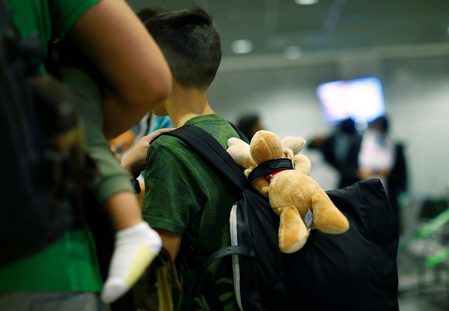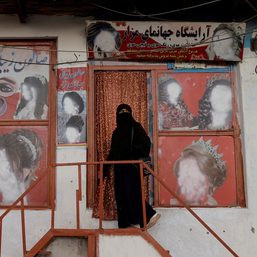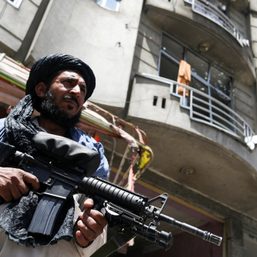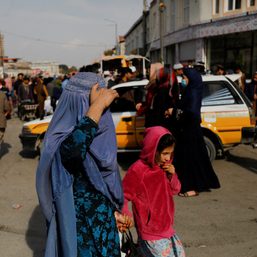SUMMARY
This is AI generated summarization, which may have errors. For context, always refer to the full article.
![[OPINION] Leave the door open: The global duty to protect the people of Afghanistan](https://www.rappler.com/tachyon/2021/08/globalduty-afghan-TL-sq.jpg)
On August 15, the world watched as Kabul, Afghanistan’s capital, fell into the hands of the Taliban. Fear and panic ensued, with women and children, minorities, journalists, and human rights defenders again becoming a target of persecution and harassment.
Afghan history is fraught with terror and violence. For decades, the country grappled with building democratic institutions while fighting off extremist movements. With the recent developments in Kabul, the fear of persecution has returned.
Violence against minorities and vulnerable populations has been well documented throughout the years of Taliban rule. Women were forbidden from participating in socio-political life, and were violated, threatened, and murdered. Minorities, human rights defenders, and journalists were targeted and killed. Civilians and civilian objects were repeatedly attacked and destroyed, a violation of International Humanitarian Law. Public executions were regularly conducted.
With the Taliban back in power, the return of terror is not just imminent; it is guaranteed.
With thousands, if not millions, of Afghans and other persons living in Afghanistan hoping to leave the country at any instance possible, the world must take responsibility to ensure that Afghans will be able to seek refuge in any place that could keep them safe.
The Philippines, as one of the few Asian states to have ratified and acceded to the 1951 Convention and its 1967 Protocol Relating to the Status of Refugees, is not exempt from this responsibility to protect asylum seekers and refugees. For one, it boasts a rich history of opening its doors to persons fleeing their places of origin due to persecution. A few years ago, the Philippines has also institutionalized support to asylum seekers and refugees through the Refugees and Stateless Persons Protection Unit of the Department of Justice, which acts as a dedicated office in processing and evaluating asylum applications. The office also works with other government and non-government agencies and civil society groups in extending assistance to refugees.
Given this track record, the Philippine government is expected to extend humanitarian protection for persons of concern, including those coming from Afghanistan.
While this snapshot of refugee protection mechanisms in the Philippines demonstrates good opportunities for persons of concern to access safety, the same cannot be said about other States, especially those that are not signatories to the 1951 Refugee Convention. The practice of refoulement, or forcibly returning an asylum seeker to their country of origin, remains a reality in many States. Asylum seekers, particularly those from the Middle East, are also vulnerable to being tagged as part of terrorist or extremist armed groups. In some instances, asylum seekers are sent to offshore detention camps, and often have to live in inhumane conditions. Many countries, especially in the West, continue to close off their borders to persons of concern.
The usual debate on the global refugee discourse is focused on the duty of signatory and non-signatory States to the 1951 Refugee Convention as regards the protection of asylum seekers and refugees. However, whether a State is a party to the Convention or not does not devoid it of its obligation to support persons in need of humanitarian protection. Instruments such as the International Covenant on Civil and Political Rights, International Covenant on Economic, Social, and Cultural Rights, the Convention on the Elimination of Discrimination Against Women, other human right bodies, and international customary law provide a legal framework that still encompasses the protection of persons of concern. The Global Compact on Refugees lays down the protection framework for refugees and host communities as well.
Given the obligation to protect asylum seekers and refugees, the world must not eschew on its duty to ensure that Afghans will be able to access protection and refuge. They have to open the door for those seeking protection, and leave it open for more persons to be protected.
Governments, including the Philippines, must ensure that all applications of Afghan asylum seekers would be received, and that due process will take place in the assessments of said applications. This, however, must be without prejudice to the exclusion clauses provided in the Refugee Convention and other similar instruments. An opportunity for appeal must be presented should there be a negative decision. Asylum seekers should not be subjected to inhumane treatment in camps and detention centers, nor should they be forcibly returned to their country of origin. Special attention must also be provided to women and children, human rights defenders and journalists, and minorities in consideration of their vulnerability. Humanitarian assistance must be extended to all persons of concern, and more importantly, to those who continue to live in Afghanistan who cannot leave their country.
States must also mainstream humanitarian protection in its institutions. Like what is practiced in the Philippines, mechanisms on asylum applications and refugee protection must be established within the governance structure. Persons of concern must not be excluded in the socio-political sphere. They must be supported towards self-reliance by providing them with access to livelihood, education, health, and other services. Non-signatory States must also be encouraged to become parties to the 1951 Refugee Convention. For governments with existing humanitarian mechanisms for asylum seekers such as the Philippines, a review of their available processes is recommended, in view of identifying aspects that could be utilized in responding to the current Afghan humanitarian situation.
Lastly, States must find a peaceful solution in ensuring the protection of persons living in Afghanistan. While supporting asylum seekers from the country is crucial, it is equally important that the root causes of forced movement – including persecution and human rights violations – must be addressed. Amid the bleak socio-political environment in Afghanistan, the United Nations and other members of the international community must engage both the remaining Afghan state institutions and the Taliban to ensure safety of all persons in the country, including their safe passage out of Afghanistan should they wish so.
The most inhumane thing that the world could do at this point in history is to close the door to an Afghan asylum seeker, and not give them the chance to even lodge an application to seek safety in another country. The world cannot simply watch Afghanistan crumble in the hands of terrorists and human rights violators; it must act to open safe passages for movement of civilians. Simple thoughts and prayers will not transport persecuted communities to places of safety. The Afghan people need concrete solutions. They need an international community willing and able to provide humanitarian protection and support. They need countries leaving their doors open for them so they can find safety and security to live their lives with dignity. – Rappler.com
Reinna S. Bermudez is Chief of the Center for Crisis, Conflict, and Humanitarian Protection at the Commission on Human Rights, and a Juris Doctor student at the University of the Philippines College of Law.
Voices features opinions from readers of all backgrounds, persuasions, and ages; analyses from advocacy leaders and subject matter experts; and reflections and editorials from Rappler staff.
You may submit pieces for review to opinion@rappler.com.
Add a comment
How does this make you feel?






There are no comments yet. Add your comment to start the conversation.